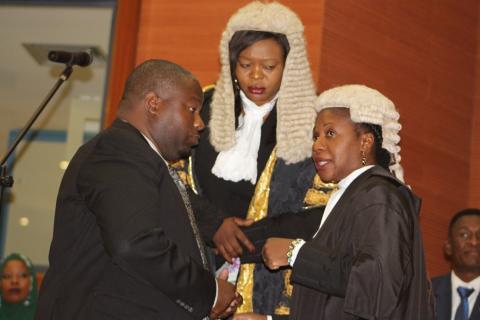The beleaguered opposition leader, Kondwani Nankhumwa, initially poised to introduce a private member’s bill aimed at initiating a constitutional amendment to disqualify individuals aged over 80 from vying for the presidency, has reversed his stance. Nankhumwa, concurrently serving as the legislator for Mulanje Central, opted to retract the Bill from the parliamentary agenda during proceedings yesterday.
According to a source privy to the deliberations of Parliament’s Business Committee, comprised of leaders from parties represented in the National Assembly responsible for setting the legislative agenda, Nankhumwa independently withdrew the proposed amendment Bill, along with two additional motions.
The source said Nankhumwa also withdrew a motion to summon President Lazarus Chakwera to face Parliament and answer questions on socio-economic problems facing the country and another on diversifying forms of identities when registering voters for the 2025 General Elections other than national identity cards only.
Said the source: “When the meeting started, even before being asked, Nankhumwa withdrew the motion on age limit. So, it’s withdrawn. There is nothing of that sort on the House agenda.”
Parliament spokesperson Ian Mwenye also confirmed the development.
“Yes, I can confirm that it [the age limit Bill] has been withdrawn,” he said.
But three sources close to Nankhumwa indicated that the Bill could resurface with a different legislator as sponsor.
The sources, three senior Democratic Progressive Party (DPP) members and legislators, said the withdrawal of the Private Member’s Bill was a “strategic pause” for someone else other than Nankhumwa to bring it back into the House later to avoid it being seen as “personalised”.
Said one of them: “Make no mistake, this Bill has broad bipartisan support among top DPP leaders because if it passes, people have an opportunity to fight for the presidency without the fear of Peter Mutharika. Other parties in the House are also in support of it.”
Another legislator from the Southern Region corroborated that there was huge support for the Bill on both sides.
When contacted yesterday, Nankhumwa refused to comment on reasons for withdrawing the Bill.
But Malawi Law Society (MLS) president Patrick Mpaka reiterated his earlier stance that the Constitution in Section 87 addresses issues of capability of a President and Vice-President, as such, there is no constitutional gap to address.
He said: “Amending a Constitution is quite a serious matter and should ordinarily seek to advance and protect the public more than private interests.
“Proposed changes to the Constitution must be objective and have regard to the wishes of the people of Malawi generally.”
Mpaka further said such a proposed change comes through a proper public Bill not a Private Member’s Bill, unless there are exceptional grounds, parliamentarians “must invariably limit their role to enacting rather than initiating laws”.
South Africa-based law professor Danwood Chirwa agreed with Mpaka that constitutions should not be amended for political expediency, to exact personal revenge or to target specific individuals however distasteful one feels about them.
He said while the proposed amendment touched a provision not listed in the schedule, it was possible to argue that it touched on the right to political participation and the equality clause, both of which cannot be amended without putting the question to a referendum.
Chirwa, who teaches law at the University of Cape Town, said: “Only the constitutional court and Supreme Court can determine that question. In short, this gambit is unlikely to pass. If it did, it won’t be implemented to bar the particular candidate they have in mind.
“Let elections decide who the President becomes without weaponising constitutional amendments.”
In a separate interview, private practice lawyer John-Gift Mwakhwawa said he was not surprised the Bill had been withdrawn.
He said: “We should not allow Parliament to pass legislation that targets individuals as would be the case in this scenario. The real issue is the age at which one can stand for office of President.”
According to a memorandum of the withdrawn proposed amendment, the Bill sought to amend Section 80 (6)(b) of the Constitution which provides for age eligibility of presidential candidates.
It reads in part: “Section 80 (6)(b) of the Constitution Act No 20 of 1994 of the laws of Malawi [hereinafter referred to as the ‘Constitution’] is amended by inserting the following new words ‘and is not more than eighty years old’ at the end of Section 80 (6)(b).”
This was going to be a second attempt after a similar move failed in 2018 when former DPP legislator for Nsanje South West Joseph Chidanti-Malunga proposed that the maximum age for those aspiring for the presidency should be capped at 65.
Currently, Section 80(6) of the Constitution stipulates that a person is eligible for election as President or Vice-President if he or she is a citizen of Malawi by birth or descent and has attained the minimum age of 35, but there is no maximum age cap.
In 2017, a report by the Special Law Commission on Electoral Reforms said it would be difficult to justify such exclusion where a potential candidate was, for all relevant purposes, fit and able to execute the functions of an elected office.
Further, the Constitutional Review Report of 2007 also looked at the matter and the commission then considered that this was a political issue best left to the political process.













